Heide:
Permission to enter AMITC? Has anyone read the book?
Ann:
(Heide) Has anyone read the book?
Yes, I was just rereading it on the way to and from Cape Cod. The movie
kept amazingly close to the novella. It helped that the book is only
100
pages.
Laura:
I read the book. I found the children to be wonderful characters who
surprisingly help heal a very wounded Tom Birkin.
Evelyn:
I read it too. Found it helped to fill in the blanks in the film.
Thought
the film was v. faithful to the book. I am getting it back this week
from
Library Loan.
Heide:
The book is on my reading list. I'd like to hear how the book is
different/similar
to the film. Is there more about Vinny?
Moon is supposed to be homosexual but that's not clear from
the film
except from the one line the man says to Tom in a message he wants to
be
delivered to Moon but I have difficulty making it out. Something about
"Bugger his bum." Is there more pertaining to Moon's homosexuality in
the
book?
The apple symbolism is very strong in the film. Is it conveyed
in even
more depth in the book?
How is Tom described in the book? Can you picture Colin from
the description?
With what emotion are the people on the train looking at Tom?
Guilt?
Pity? Distaste? It's not immediately obvious that he was in the war. A
twitch and stammer do not automatically brand you as a veteran though
there
were so many "intact" wounded men from the war wandering around, he may
not have been an uncommon sight even in Oxgodby.
(Laura) I found the children to be wonderful characters who
surprisingly
help heal a very wounded Tom Birkin.
I love the Ellerbeck children in the film and can see how they are
comforting to Tom as they sit quietly in the pew with their gramophone
watching him work on the mural. I felt badly for Cathy when Tom
pretended
he wasn't in his belfry at the end of the movie when she comes to call.
I hope she couldn't smell his cigarette and know he was up there.
Evelyn:
As soon as the book comes from Library Loan, I'll answer your
questions,
Heide, quoting the "chapter and verse." I read it over a year ago.
Tremendous.
Actually, the film also served to make the book more enjoyable.
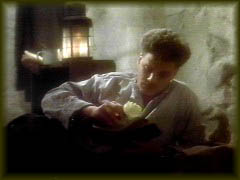 Ann: Ann:
For a long time, I thought the book that Birkin pressed the flower
in was just any old book, but after about my 10th time watching the
film
(which gets better each time), I now think that it is the same book the
Old Birkin is carrying at the very end of the story.
The old man is carrying a book on architecture that he wrote
and, when
the flower is pressed, you can see a diagram of different columns. In
other
words, he presses the flower in a book he has not written yet. I really
like the circularity of that image.
Heide:
The first time I saw this film, I didn't think I could bear watching
it again but now that I own it, I watch it again and again. I thought
it
was painfully sad at first but now don't find it so. What saves me is
seeing
that as an old man, Tom is well (meaning healthy), perhaps not
prosperous
but he still finds meaning and takes pleasure in what he did.
Beautifully
filmed, beautifully, subtly acted. Rife with symbolism which I love to
try to decipher.
I hope some people have thoughts on the questions I'd like to
bring
up. Some I've decided on the answer, some I have not.
Why does Tom resist Alice? I don't think it's because of
Vinny. Does
he think she is that unapproachable for someone as damaged as he
considers
himself to be? Is it his sense of morality? We know she's Eve tempting
him. Tempting him from where? He's not exactly in the garden of Eden.
She's
practically quivering, she wants him so much. What keeps him from
kissing
her in the belfry?
 One
of my favorite scenes is when Alice comes to see the mural and she
climbs
up the scaffolding. He's so eager and happy she's there. My favorite
look
is when she starts to descend the ladder and for a moment she pauses
and
they're at eye level. He looks so anxious as if he doesn't want her to
leave. One
of my favorite scenes is when Alice comes to see the mural and she
climbs
up the scaffolding. He's so eager and happy she's there. My favorite
look
is when she starts to descend the ladder and for a moment she pauses
and
they're at eye level. He looks so anxious as if he doesn't want her to
leave.
Love the scene in the woods when he says, "Many men would say
that you
were beautiful, Mrs. Keach." If it was going to happen, I think it
would
have happened there. Is he humiliated that she saw him so vulnerable
after
the shot rang out?
More and more scenes I love. In town when Alice sees Tom
watching her
through the window of the pub. She looks at him, quickly, guiltily
looks
at her husband, then looks back at Tom. They walk away and he gazes
after
her.
(Ann) The old man is carrying a book on architecture that
he wrote
Thanks, Ann, I had no clue. I knew it couldn't be a bible. What makes
you say he wrote the book? I will re-watch, of course, but I never saw
that.
Cheryl:
(Laura)...children to be wonderful characters who surprisingly
help
heal...Birkin.
Interesting about the children in the film I was so annoyed with them.
(Heide) Moon is supposed to be homosexual...one
line...difficulty
making it out....is there more...in the book?
I wondered when (1) he offers to Birkin, "Just haven't met the right
girl yet," which is a pretty standard line, especially in the past, and
(2) he doesn't seem interested in Alice or any other women.
But really the only other clue to me, and the thing I liked
most about
Branagh's understatement, was this: (3) Birkin meets the angry officer
in town and, in the next scene, Moon offers Birkin milk (for his tea, I
assume) by the tent. The way Branagh sits, legs tucked under and hands
folded in his lap demurely, was new to us. They discuss Alice and Moon
reverses himself, agreeing that maybe it's not so bad that Birkin
hasn't
seen her very much.
Moon says something about giving "it" up, the two of them, for
the easy
life. Birkin toasts to the easy life. But Moon doesn't toast back. It
makes
sense to give up sex to make things simpler, but apparently Moon can't
or won't, which is what happened to get him taken off the front. The
next
scene, I think, in the tavern, Moon says he went around the bend a
little
six months before the end, losing "chaps he cared for." Moon may try to
veil his history while referring to general horrors of war, but given
the
earlier scenes in this sequence we hear them with a sexual twist: he
was
willing to risk his reputation for sex/love; or he used sex/love to
help
him survive and got caught; or he realized that who you care for may be
dead this afternoon. How ever it was, he can't toast to giving it up.
So,
visual cue: the way Moon's sitting; accompanying story development:
sequence
(of scenes) about Moon's private life, which we've known nothing of
till
now.
(Heide) didn't think I could bear watching it
again...painfully sad
at...as an old man...he still finds meaning and takes pleasure in what
he did.
 This,
like most of CF's movies, make me smoke. All that longing! When Alice
said
to him he'd found what he was looking for, I thought, what a
wishful/mean
thing to say. But with Old Birkin's happiness at returning to the
church
and remembering, I suppose it was true. It might not have been what I
wanted
him to have, but it was what he'd come for. This,
like most of CF's movies, make me smoke. All that longing! When Alice
said
to him he'd found what he was looking for, I thought, what a
wishful/mean
thing to say. But with Old Birkin's happiness at returning to the
church
and remembering, I suppose it was true. It might not have been what I
wanted
him to have, but it was what he'd come for.
(Heide) Why does Tom resist Alice? ...kissing her in the
belfry?
Much to my dismay, she can't do anything; she's the vicar's wife. He's
been as open with her as he can, and she hasn't stepped the least out
of
bounds, so can he really do anything more than he did? What can he
offer
her? She has a husband and home and life, and he has a wife, war
wounds,
and not much else. He's (masterfully) inarticulate; she nods in
agreement/understanding;
but she proves to be not the kind of woman who's going to step out of
her
big house (however empty it is). Now she probably never will. But that
doesn't make ME feel any better :) You just want her to say something,
anything. But there I am, suffering right along with him.
Sofie:
AMITC is one of my favorite CF films. I agree with Heide about the
wonderful symbolism. Restoration of the painting as well as his life.
Scene
of hell and his view of war. When he first sees Alice, next scene he is
uncovering an angel.
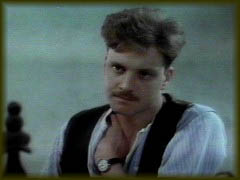 When
I read Heide's question about why he doesn't make his move on Alice in
the belfry, I watched it again. In the scene before he confronts the
vicar
and I think he gains sympathy for him. He also knows what it's like to
have a wife be unfaithful and doesn't want to inflict that pain on
another.
The healing experience has given him back his own moral agency and the
desire NOT to hurt or destroy others. I'd love to hear more of
everyone's
opinions. When
I read Heide's question about why he doesn't make his move on Alice in
the belfry, I watched it again. In the scene before he confronts the
vicar
and I think he gains sympathy for him. He also knows what it's like to
have a wife be unfaithful and doesn't want to inflict that pain on
another.
The healing experience has given him back his own moral agency and the
desire NOT to hurt or destroy others. I'd love to hear more of
everyone's
opinions.
Bethan:
I think that your interpretation of why Tom holds back from Alice,
despite the obvious pain to both of them, is very perceptive. There's a
lot I would like to say about AMITC (when time permits); it is
undoubtably
one of my favourite CF films and one which I can watch and rewatch.
The ending I find almost unbearably moving. It is the music,
the juxtaposition
of the young Birkin and his older ravaged self, the poignancy of the
old
man reliving his memories, and the heartrending fact that he has
obviously
never again found love. He carries the book with the pressed flower,
which
Alice gave to him on the day in the woods when he nearly declared his
love
for her. TEP didn't move me one jot (except poor sweet
Geoffrey!)...this
I find difficult to watch.
Evelyn:
(Sofie) He also knows what it's like to have a wife be unfaithful
and doesn't want to inflict that pain on another. The healing
experience
has given him back his own moral agency and the desire NOT to hurt or
destroy
others.
You have given us a v. poignant reason for his repression in the
belfry!!
Does anyone else see Alice as a temptress and not so angelic?
Fondling
those apples...biting one...lots of smoldering looks...almost
assaulting
him.
Great cast!
Heide:
Two very good points to ponder as to why Tom doesn't take Alice in
the belfry:
(Cheryl) What can he offer her? She has a husband and home
and life,
and he has a wife, war wounds, and not much else.
(Sofie) He also knows what it's like to have a wife be
unfaithful
and doesn't want to inflict that pain on another.
Though Tom gained strength during his month in the country (was it
only a month?), he seems to feel inadequate in Alice's presence.
Doesn't
his stutter return when she is near him? And he is a kind and
thoughtful
man who feels Vinny's desertion strongly.
(Evelyn) Does anyone else see Alice as a temptress and not
so angelic?
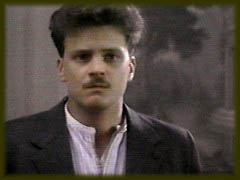 Good
point, Evelyn. Despite the lighting, Alice is no angel. Especially felt
this when Tom comes to the house to collect his payment. First she
shows
Tom all the empty rooms of the house. Her voice is trembling with
repressed
emotion (anger?). "Can be quite oppressive. Gives me nightmares
sometimes."
IMO, the rooms are a symbol of the emptiness of her marriage and she
seems
quite eager to show Tom this. Then when they arrive in the room where
her
husband is, she seems to be goading Keach. "The rooms, we don't know
how
to fill them, do we?" Keach seems almost cowed by his wife. What is
going
on here? The undercurrents are so strong. Good
point, Evelyn. Despite the lighting, Alice is no angel. Especially felt
this when Tom comes to the house to collect his payment. First she
shows
Tom all the empty rooms of the house. Her voice is trembling with
repressed
emotion (anger?). "Can be quite oppressive. Gives me nightmares
sometimes."
IMO, the rooms are a symbol of the emptiness of her marriage and she
seems
quite eager to show Tom this. Then when they arrive in the room where
her
husband is, she seems to be goading Keach. "The rooms, we don't know
how
to fill them, do we?" Keach seems almost cowed by his wife. What is
going
on here? The undercurrents are so strong.
And then we have the apple scenes. The way she sniffs it and
rubs it
with her hands, smells her hands. Yeah, she learned it from her father
but it's very suggestive and is making the apple very tempting to poor
Tom.
Sofie:
(Heide) the rooms are a symbol of the emptiness of her
marriage.
She seems to be goading Keach.
I also saw her obvious intentions toward Tom in this scene. Her offer
of showing him the way through the wood in front of her husband?
PLEASE!!
And she didn't mention that she had seen the painting because she
probably
didn't go there to see it as much as to see him. Or she might have been
too flustered after the meeting to want to bring it up.
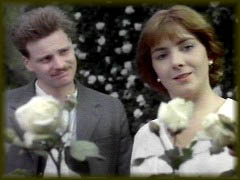 After
making Tom aware of the emptiness of her married life she gives him a
rose.
She is all silky and sweet, and he seems to be hanging on her every
word
whereas with others he is guarded. After
making Tom aware of the emptiness of her married life she gives him a
rose.
She is all silky and sweet, and he seems to be hanging on her every
word
whereas with others he is guarded.
Evelyn:
(Heide) Keach seems almost cowed by his wife. What is going on
here?
The undercurrents are so strong.
I think the Reverend Keach is impotent. That would explain the
emptiness
of the marriage and her "hots" for Tom.
But what is the symbolism of that lone piece of
furniture...that in-laws
bought at an auction?? Does that represent Rev. Keach...all alone
playing
his violin in that empty room?
Laura:
I do own the book; I read it about two years ago. Moon is more of a
homosexual in the book than they portray him in the movie. Tho' the guy
who sees Birkin in the cafe in town mentions that Moon "buggered the
batboy"
and the award he received wasn't a well-respected decision, in his
opinion.
Cheryl:
(Heide) seems to be goading Keach. "The rooms, we don't know
how
to fill them, do we?" Keach seems almost cowed by his wife.
(Evelyn) But what is the symbolism of that lone piece of
furniture...auction??
Does that represent Rev. Keach...violin in that empty room?
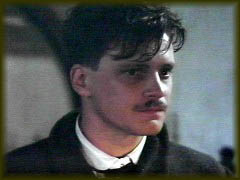 Keach
doesn't invite Birkin to stay in his house at the very beginning, never
considers that an option. Birkin remarks during Keach's sermon, what
about
me (having no bed)? Alice started her relationship with him by saying
it
didn't seem right for him to be sleeping in the belfry when they were
in
their beds. Moon asks what Keach has done for Birkin, which is nothing.
Alice makes an opening you could drive a truck through for Keach to
invite
him stay, and Keach doesn't. Throughout, Keach's lack of charity. And
lack
of relationship, connection—he wants only to listen to himself; he
doesn't
even imagine visitors will come anymore. Alice wants Birkin and Keach
to
know that it's ok with her for Birkin to move in, which everyone knows
would be a disaster. Keach
doesn't invite Birkin to stay in his house at the very beginning, never
considers that an option. Birkin remarks during Keach's sermon, what
about
me (having no bed)? Alice started her relationship with him by saying
it
didn't seem right for him to be sleeping in the belfry when they were
in
their beds. Moon asks what Keach has done for Birkin, which is nothing.
Alice makes an opening you could drive a truck through for Keach to
invite
him stay, and Keach doesn't. Throughout, Keach's lack of charity. And
lack
of relationship, connection—he wants only to listen to himself; he
doesn't
even imagine visitors will come anymore. Alice wants Birkin and Keach
to
know that it's ok with her for Birkin to move in, which everyone knows
would be a disaster.
Alice points out the mystery thing, in the course of talking
about emptiness
and filling. That piece seems to symbolize her desperation with Keach
(piece
of something else, don't know what it is, no one wanted it, doesn't do
anything, but at least it was something). And maybe Birkin, who might
be
something for her to fill her emptiness with.
(Sofie) she didn't mention that she had seen the painting
because
she probably didn't go there to see it as much as to see him
And maybe to keep it between themselves, to pointedly exclude Keach.
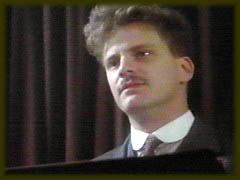 One
of my favorite themes is when Birkin talks about being a restorer—"too
much and some chap disappears, not enough and someone doesn't make it
back
from 500 years ago." By the time he leaves he's uncovered those who
around
him are, by not forcing but also by not resisting. Had he pushed, Alice
might have changed, and that's not what he does. He serves the Great
Painter,
cleaning so you can see what's there, but doesn't consider himself an
artist
to create or effect some change. He's horrified by the idea of touching
up something he finds. One
of my favorite themes is when Birkin talks about being a restorer—"too
much and some chap disappears, not enough and someone doesn't make it
back
from 500 years ago." By the time he leaves he's uncovered those who
around
him are, by not forcing but also by not resisting. Had he pushed, Alice
might have changed, and that's not what he does. He serves the Great
Painter,
cleaning so you can see what's there, but doesn't consider himself an
artist
to create or effect some change. He's horrified by the idea of touching
up something he finds.
Also, Alice is not the only one to underscore the kind of man
Keach
is—he does himself. In the last monologue when he talks about people
not
being religious and not being moved by the practices, it's so painful
to
see him looking for his own spiritual satisfaction through other
people's
behavior. What a walled-off man.
Heide:
(Evelyn) I think the Reverend Keach is impotent.
Cha-cha-cha! Interesting point. We know he is impotent as a minister.
I don't have his dialogue handy but he complains bitterly to Tom about
his congregation, they're not moved by him, he's only wanted at
funerals,
etc. A signal about his marriage too?
(Sofie) And she didn't mention that she had seen the
painting because
she probably didn't go there to see it as much as to see him.
Love the guilty looks on both Tom and Alice's face when Keach expresses
surprise that she has already seen the painting. They hadn't even done
anything other than "lusting in their hearts."
(Cheryl) By the time he leaves he's uncovered those who
around him
are, by not forcing but also by not resisting. Had he pushed, Alice
might
have changed, and that's not what he does.
He wouldn't even have needed to push much. She would have come with
a whistle. But yes, she would have changed and as you said earlier, she
is a wife, has a home. What kind of woman would she have become if she
had given up that comfortable life? But we want her to.
I'm always questioning even my own convictions about the story
and that's
why I love to read others' views even if I don't always agree with
them.
At their best, these film discussions give me new insight into the
stories
and I love to see the collaboration.
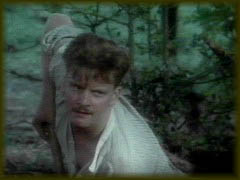 But
to get to the less lofty images, how about Tommy boy working in the
grave?
Oomph. He's sweaty, he's dirty, those braces are off, that shirt is
hanging
out. Love to see him get physical. But
to get to the less lofty images, how about Tommy boy working in the
grave?
Oomph. He's sweaty, he's dirty, those braces are off, that shirt is
hanging
out. Love to see him get physical.
Don't mind looking at the shot of him from above when the
bells go off
on his first Sunday in the belfry. He's lying there (love that
undershirt),
looking so long, lean and lanky.
Evelyn:
I received AMITC today and read it. So in the next few days I'll answer
questions from the book. Heide, Sophie, Cheryl, Ann, Bethan , you were
all correct in your assumptions. The jacket of the book has a review:
"a
small tale of lost love is also a hymn about art and the compensating
joy
of the artist, both in giving and receiving."
(Heide) Is there more about Vinny in the book?
Not much.
"I told him [Moon] about Vinny and that she'd gone off with
another
chap. I didn't tell him that she'd almost certainly bedded down with
other
men whilst I was overseas. Nor that she left me once before." (p.62)
Earlier, he remarks that "Vinny had quality....look where it
got me."
When he gets her letter at the end: "Heaven knows how she had
learnt
where I was, but it was from Vinny: she wanted me home again. There
were
other things too but that's what it amounted to—she wanted me back. I
had
no illusions. She would go off again, would come back again. And I
should
be there." (p.110)
(Heide) How is Tom described in the book
Written by Tom as a flashback, so no physical description . But he
says he is 26, Keach 30, Alice 19 or 20. Moon is 26.
Sgt Milburn: "Last time I saw you [Birkin] they were carting
you off...shell-shock
wasn't it?...Not many of you chaps came through." (p.90)
Tomorrow: Discussion of hell with Alice. Moon's homosexuality.
With
Alice in the belfry.
|
 Ann:
Ann:
 One
of my favorite scenes is when Alice comes to see the mural and she
climbs
up the scaffolding. He's so eager and happy she's there. My favorite
look
is when she starts to descend the ladder and for a moment she pauses
and
they're at eye level. He looks so anxious as if he doesn't want her to
leave.
One
of my favorite scenes is when Alice comes to see the mural and she
climbs
up the scaffolding. He's so eager and happy she's there. My favorite
look
is when she starts to descend the ladder and for a moment she pauses
and
they're at eye level. He looks so anxious as if he doesn't want her to
leave.  This,
like most of CF's movies, make me smoke. All that longing! When Alice
said
to him he'd found what he was looking for, I thought, what a
wishful/mean
thing to say. But with Old Birkin's happiness at returning to the
church
and remembering, I suppose it was true. It might not have been what I
wanted
him to have, but it was what he'd come for.
This,
like most of CF's movies, make me smoke. All that longing! When Alice
said
to him he'd found what he was looking for, I thought, what a
wishful/mean
thing to say. But with Old Birkin's happiness at returning to the
church
and remembering, I suppose it was true. It might not have been what I
wanted
him to have, but it was what he'd come for.  When
I read Heide's question about why he doesn't make his move on Alice in
the belfry, I watched it again. In the scene before he confronts the
vicar
and I think he gains sympathy for him. He also knows what it's like to
have a wife be unfaithful and doesn't want to inflict that pain on
another.
The healing experience has given him back his own moral agency and the
desire NOT to hurt or destroy others. I'd love to hear more of
everyone's
opinions.
When
I read Heide's question about why he doesn't make his move on Alice in
the belfry, I watched it again. In the scene before he confronts the
vicar
and I think he gains sympathy for him. He also knows what it's like to
have a wife be unfaithful and doesn't want to inflict that pain on
another.
The healing experience has given him back his own moral agency and the
desire NOT to hurt or destroy others. I'd love to hear more of
everyone's
opinions.  Good
point, Evelyn. Despite the lighting, Alice is no angel. Especially felt
this when Tom comes to the house to collect his payment. First she
shows
Tom all the empty rooms of the house. Her voice is trembling with
repressed
emotion (anger?). "Can be quite oppressive. Gives me nightmares
sometimes."
IMO, the rooms are a symbol of the emptiness of her marriage and she
seems
quite eager to show Tom this. Then when they arrive in the room where
her
husband is, she seems to be goading Keach. "The rooms, we don't know
how
to fill them, do we?" Keach seems almost cowed by his wife. What is
going
on here? The undercurrents are so strong.
Good
point, Evelyn. Despite the lighting, Alice is no angel. Especially felt
this when Tom comes to the house to collect his payment. First she
shows
Tom all the empty rooms of the house. Her voice is trembling with
repressed
emotion (anger?). "Can be quite oppressive. Gives me nightmares
sometimes."
IMO, the rooms are a symbol of the emptiness of her marriage and she
seems
quite eager to show Tom this. Then when they arrive in the room where
her
husband is, she seems to be goading Keach. "The rooms, we don't know
how
to fill them, do we?" Keach seems almost cowed by his wife. What is
going
on here? The undercurrents are so strong.  After
making Tom aware of the emptiness of her married life she gives him a
rose.
She is all silky and sweet, and he seems to be hanging on her every
word
whereas with others he is guarded.
After
making Tom aware of the emptiness of her married life she gives him a
rose.
She is all silky and sweet, and he seems to be hanging on her every
word
whereas with others he is guarded.  Keach
doesn't invite Birkin to stay in his house at the very beginning, never
considers that an option. Birkin remarks during Keach's sermon, what
about
me (having no bed)? Alice started her relationship with him by saying
it
didn't seem right for him to be sleeping in the belfry when they were
in
their beds. Moon asks what Keach has done for Birkin, which is nothing.
Alice makes an opening you could drive a truck through for Keach to
invite
him stay, and Keach doesn't. Throughout, Keach's lack of charity. And
lack
of relationship, connection—he wants only to listen to himself; he
doesn't
even imagine visitors will come anymore. Alice wants Birkin and Keach
to
know that it's ok with her for Birkin to move in, which everyone knows
would be a disaster.
Keach
doesn't invite Birkin to stay in his house at the very beginning, never
considers that an option. Birkin remarks during Keach's sermon, what
about
me (having no bed)? Alice started her relationship with him by saying
it
didn't seem right for him to be sleeping in the belfry when they were
in
their beds. Moon asks what Keach has done for Birkin, which is nothing.
Alice makes an opening you could drive a truck through for Keach to
invite
him stay, and Keach doesn't. Throughout, Keach's lack of charity. And
lack
of relationship, connection—he wants only to listen to himself; he
doesn't
even imagine visitors will come anymore. Alice wants Birkin and Keach
to
know that it's ok with her for Birkin to move in, which everyone knows
would be a disaster.  One
of my favorite themes is when Birkin talks about being a restorer—"too
much and some chap disappears, not enough and someone doesn't make it
back
from 500 years ago." By the time he leaves he's uncovered those who
around
him are, by not forcing but also by not resisting. Had he pushed, Alice
might have changed, and that's not what he does. He serves the Great
Painter,
cleaning so you can see what's there, but doesn't consider himself an
artist
to create or effect some change. He's horrified by the idea of touching
up something he finds.
One
of my favorite themes is when Birkin talks about being a restorer—"too
much and some chap disappears, not enough and someone doesn't make it
back
from 500 years ago." By the time he leaves he's uncovered those who
around
him are, by not forcing but also by not resisting. Had he pushed, Alice
might have changed, and that's not what he does. He serves the Great
Painter,
cleaning so you can see what's there, but doesn't consider himself an
artist
to create or effect some change. He's horrified by the idea of touching
up something he finds.  But
to get to the less lofty images, how about Tommy boy working in the
grave?
Oomph. He's sweaty, he's dirty, those braces are off, that shirt is
hanging
out. Love to see him get physical.
But
to get to the less lofty images, how about Tommy boy working in the
grave?
Oomph. He's sweaty, he's dirty, those braces are off, that shirt is
hanging
out. Love to see him get physical.